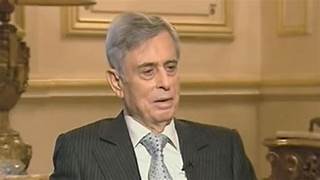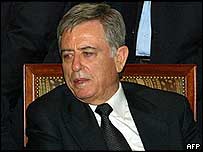Khaddam: The president is politically dead; he fights to stay in power, but the Syrians have made a general principle decision: they want to overthrow this regime.
Is President Assad moving towards the end or is this the beginning of his regime?
Khaddam: The president is politically dead; he fights to stay in power, but the Syrians have made a general principle decision: they want to overthrow this regime.
And when will Bashar step down?
Khaddam: Perhaps within weeks. Syrians have suffered from over four decades of dictatorial rule. There is an immense amount of anger that can no longer be controlled.
The regime claims that the protesters are armed and that it is likely to open fire on the soldiers.
Khaddam: This is a lie. However, there are destructive forces from foreign countries…
Who are you referring to?
Khaddam: I mean Iran. Anyone who imagines that Damascus still makes political decisions without Iran is mistaken. Bashar and his brother Maher…
Who leads the Republican Guard…
Khaddam: They have become the executive assistants to the Iranian Revolutionary Guard. Most of the Syrian security personnel have been trained in Iran, and there has been close military and security cooperation between the two countries for years. Iran’s cultural influence is increasing: Tehran has established religious institutions in Syria, and Iranian pilgrims go to the Umayyad Mosque in Damascus to atone for themselves—a religious ritual that did not exist in previous eras.
Were you part of the Assad regime for decades?
Khaddam: I distanced myself from Bashar and have done so for years, and the Syrians know that. The reality is that I trusted that Hafez, from the beginning, cared about certain aspects of my life, which I do not allow now.
During your tenure as Vice President, the Hama massacre occurred, in which the Syrian army killed over 20,000 civilians. What was your role?
Khaddam: Hafez’s brother, Rifat, took responsibility for the Hama massacre. He was acting as president during that period, suffering from severe illness, and it was said that he was running on his deathbed. After that, he hastily appointed a committee to rule from its center, and the committee consisted of me and prominent members of the Ba’ath Party who only learned later about what happened in Hama.
Hama is one of the darkest chapters in Syria’s history. Could this massacre be repeated today?
Khaddam: What is happening today in Daraa is moving in the same direction. Civilians are being killed there as well, but today there is the internet, and the whole world witnesses it shortly after humans die anywhere.
You have significant knowledge of the family: Bashar al-Assad was seen as the hope, isn’t that so?
Khaddam: He promised reforms, and the country was supposed to open up. I and many Syrians believed him, but Bashar indeed offered nothing but procrastination in his promises. He wanted to become like his father. Hafez was a political professional and a strategic man who always knew when to make a broad decision. In contrast, Bashar is impulsive, reckless, lacks charisma, and lacks foresight.
How strong is the Assad family today?
Khaddam: Extremely strong. We can talk about no more than 20 people who share the wealth of Syria among themselves, including ten individuals from the Assad family and their relatives from the Makhlouf family who use these riches with them. For example, Rami Makhlouf…
Bashar’s wealthy cousin…
Khaddam: He controls a network representing 25 percent of the Syrian national output.
It is said that Assad is just a symbolic head, and there are others who control Syria, such as powerful leaders of the secret police.
Khaddam: It is clear that Bashar is not the ruler. After his ascent to power, he appointed people of his choosing, especially from the Republican Guard, to prominent positions. For example, the current head of military intelligence comes from the Republican Guard.
Does Bashar have more power than former Egyptian President Hosni Mubarak?
Khaddam: Indeed, Mubarak organized politics and controlled the economy, but there were clear boundaries between him and the armed forces. This also explains why the Egyptian army, like the Tunisian army, positioned itself to protect either the revolutionaries or the people. In Syria, the army is ready to open fire on its people. Why? Because the regime chose the top commander by hand.
Is there still a future for the Ba’ath Party to which you belonged for several decades?
Khaddam: The Ba’ath Party today has nothing left of what it was at its founding. The party’s essential principles, including individual disenfranchisement and democracy based on free elections, have been destroyed. After the revolution, there won’t be a Ba’ath Party at all, but that doesn’t mean that its members won’t have the right to participate in Syria’s democratic reconstruction.
In the new Syria, the Muslim Brotherhood will also have a say. What role will Islamists play?
Khaddam: Our revolution is not limited to a specific religion or ethnic group; we all have one goal, which is to liberate Syria from this regime.
Does this include the Muslim Brotherhood as well?
Khaddam: Of course, as long as they adhere to democratic principles.
There are concerns in the West about the possibility of extremists coming to power.
Khaddam: Tell me one case in Syria where extremist acts have been carried out!
Are you saying there are no Islamists practicing violence in Syria?
Khaddam: There are indeed some, but the regime formed these groups. Its members were trained at the artillery school in Aleppo, and some were sent to Iraq, where the Syrian secret service formed the Fatah al-Islam organization. Others went to Lebanon, for example, to the Nahr al-Bared Palestinian camp to sow chaos there.
Did Bashar’s regime ignite chaos and disturbances in Lebanon?
Khaddam: Since 1979, Syria has been a link between Iran and Lebanon. In reality, Tehran sees Syria as its strategic base to enhance its influence in the Arab world. With Syria’s help, Iran supported Palestinian organizations such as Hamas and Islamic Jihad. Iran put our revolution at risk.
What if the regime in Damascus is overthrown?
Khaddam: Bashar’s fall will have a positive impact on neighboring countries. The new democratic Syria will, above all, maintain close relations with post-revolutionary Egypt, and the Syrian-Egyptian alliance will reappear. On the other hand, Iran will have to realize that its strategic ambitions will not be confined to its national borders.
And what will happen to Israel if the Assad regime falls?
Khaddam: Any future government in Damascus will adhere to the Arab peace plan, approved by the Arab League, which includes the return of the occupied Golan Heights.
But the Muslim Brotherhood does not want to recognize Israel?
Khaddam: Public opinion in Syria requires us to coordinate our policy with Arab partners. If Arab countries agree to peace with Israel, Syria will join them.
How can Europe help in the current situation?
Khaddam: Europe must assist with measures that tighten the noose on the regime. Sanctions should be imposed, and the assets of the Assad clique and their aides should be frozen.
Should the West also intervene militarily?
Khaddam: Ultimately, yes. We cannot stand idly by and watch the Syrians being slaughtered. If necessary, all means must be used.



